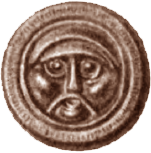Vikings in Britain and Ireland
Viking activity in the British Isles took place at a formative time in British history. What started as raiding parties evolved into great armies; these great armies started plundering but resulted in a conquest and the rule of Vikings in Britain; this conquest not only united the kingdoms of England against the Vikings, but eventually ended with Vikings sitting on the English throne.

The Anglo-Saxon Chronicle,1 annals detailing the history of Britain from the First Century through the Twelfth Century CE, were first compiled under King Alfred in the Ninth Century and are an indispensable source on the Viking Age in the British Isles. The first mention of vikings, or ‘Northmen’ and ‘Danish men,’ according to the translation by Giles and Ingram, comes from 787 CE, detailing the murder of a sheriff at the hands of the Northmen. Six years later, Vikings would sack the monastery at Lindisfarne, an act which would label them as godless.2 The Chronicle further details the yearly outcome of various encounters between the English and Vikings from 832-851, initially preserving the Danes as victors but ending in several English victories.

From 865-876, there is almost a constant upheaval in the English kingdoms, as the ‘great heathen army’ conquered huge swaths of land, killing or deposing local kings in their battles. This seemed to come to an end, with the Danes distributing their new conquests among their fighters to work and swearing oaths to the English king, Alfred.3 This would create a new state of sorts: ‘the Danelaw,’ where the Danish would impose their own laws in the lands they were settling. Conflict continued to erupt until 897, when Alfred (who had, due to his struggle against the the Danes, united most of the English kingdoms behind him) finally drove the heathen army to ruin. In the aftermath of Alfred’s victory, many Vikings either went out to other lands or settled in the Danelaw.

In 947, more Vikings began to come to England, and after capturing York, Eric son of Harold was championed as king of Northumbria, though his reign would be unstable and end in 954. This incursion lasted through the early 1000’s, when Sweyn, the King of Denmark and Norway, conducted raids on Wessex and Northumbria, ultimately being named King of England. After his death, his son, Knut (Canute) the Great4 was crowned King of England, where his descendants ruled until Edward the Confessor held the throne in 1043. Edward took the throne with the help of his mother, Emma,5 Knut’s widow, and the mother of Knut’s son, whom Edward deposed. A few attempts in 1066 and 1085 saw Knut’s descendants challenge the claim of the English throne by non-Viking kings, but they unsuccessful in taking the throne, and the Viking Age in Britain soon ended.
Thus, over the course of three centuries, Vikings exploded onto the British scene, driving the consolidation of power and changing the culture of the Isles until the kingdom they had helped to forge was strong enough to repel them.

Footnotes
1 See Ingram and Giles.
2 This raid and the resulting sentiments against the Danes are detailed in Johnson South’s Historia De Sancto Cuthberto: A History Of Saint Cuthbert And A Record Of His Patrimony.
3 A more complete account of Alfred’s reign is covered in Helm’s Alfred The Great.
4 A more complete account of Knute’s reign is covered in Rumble’s The Reign Of Cnut: King Of England, Denmark And Norway.
5 Emma is the subject of the Encomium Emmae Reginae, a contemporary political work detailing the reigns of Sweyn, Knut, Harthacnut, and Edward, with a translation by Campbell.

REFERENCES AND FURTHER RESOURCES
- Ingram, J. and J. A. Giles, eds. The Anglo-Saxon Chronicle. London: J.M. Dent & Sons, 1912. [HathiTrust]
- Johnson South, Ted, ed. Historia De Sancto Cuthberto: A History Of Saint Cuthbert And A Record Of His Patrimony. Cambridge: D.S. Brewer, 2002. [Google Books preview]
- Campbell, Alistair, ed. and tr., and Simon Keynes. Encomium Emmae Reginae. Cambridge University Press, 1998. [Google Books preview]
- Helm, P. J. Alfred The Great. New York: Crowell, 1965. [WorldCat]
- Rumble, Alexander R. The Reign Of Cnut: King Of England, Denmark And Norway. London: Leicester University Press, 1994. [WorldCat]
[S. B.]




